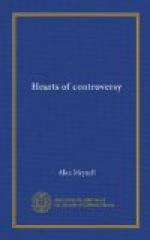But exaggeration establishes no good understanding between the reader and the author. It is a solemn appeal to our credulity, and we are right to resent it. It is the violence of a weakling hand—the worst manner of violence. Exaggeration is conspicuous in the newer poetry, and is so far, therefore, successful, conspicuousness being its aim. But it was also the vice of Swinburne, and was the bad example he set to the generation that thought his tunings to be the finest “music.” For instance, in an early poem he intends to tell us how a man who loved a woman welcomed the sentence that condemned him to drown with her, bound, his impassioned breast against hers, abhorring. He might have convinced us of that welcome by one phrase of the profound exactitude of genius. But he makes his man cry out for the greatest bliss and the greatest imaginable glory to be bestowed upon the judge who pronounces the sentence. And this is merely exaggeration. One takes pleasure in rebuking the false ecstasy by a word thus prim and prosaic. The poet intended to impose upon us, and he fails; we “withdraw our attention,” as Dr. Johnson did when the conversation became foolish. In truth we do more, for we resent exaggeration if we care for our English language. For exaggeration writes relaxed, and not elastic, words and verses; and it is possible that the language suffers something, at least temporarily—during the life of a couple of generations, let us say—from the loss of elasticity and rebound brought about by such strain. Moreover, exaggeration has always to outdo itself progressively. There should have been a Durdles to tell this Swinburne that the habit of exaggerating, like that of boasting, “grows upon you.”
It may be added that later poetry shows us an instance of exaggeration in the work of that major poet, Mr. Lascelles Abercrombie. His violence and vehemence, his extremity, are generally signs not of weakness but of power; and yet once he reaches a breaking-point that power should never know. This is where his Judith holds herself to be so smirched and degraded by the proffer of a reverent love (she being devoted to one only, a dead man who had her heart) that thenceforth no bar is left to her entire self-sacrifice to the loathed enemy Holofernes. To this, too, the prim rebuke is the just one, a word for the mouth of governesses: “My dear, you exaggerate.”
It may be briefly said that exaggeration takes for granted some degree of imbecility in the reader, whereas caricature takes for granted a high degree of intelligence. Dickens appeals to our intelligence in all his caricature, whether heavenly, as in Joe Gargery, or impish, as in Mrs. Micawber. The word “caricature” that is used a thousand times to reproach him is the word that does him singular honour.




